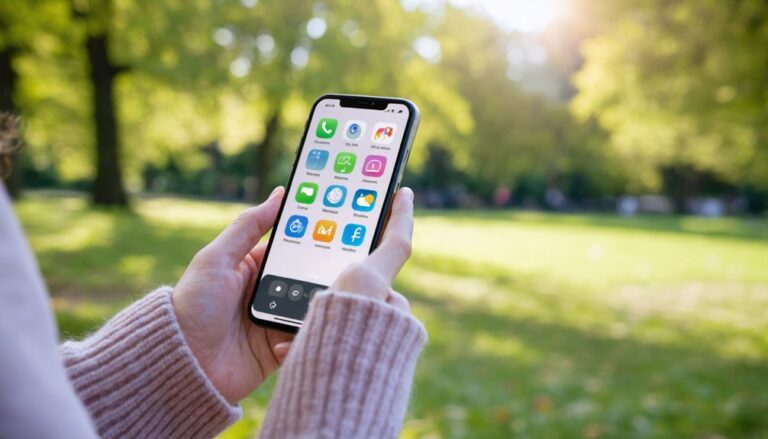Mental health apps have become vital tools for managing daily mental wellbeing. These apps offer a variety of features, including stress relief, mood tracking, emotional support, and mindfulness exercises, all tailored to individual needs.
Popular Mental Health Apps
Calm and Headspace are well-known for their guided meditations, which can help reduce stress and anxiety. Happify, on the other hand, focuses on mood tracking and stress-reduction techniques, providing users with personalized tools to manage their emotions.
With so many options available, it’s essential to find an app that aligns with your unique needs and preferences. When selecting a mental health app, consider what features are most important to you. Do you need help with stress relief, or are you looking for emotional support?
Finding the Right App for You
When choosing a mental health app, it’s crucial to consider the specific issues you’re facing. For example, if you’re struggling with anxiety, an app with guided meditations and relaxation techniques may be the most effective. On the other hand, if you’re looking to improve your mood, an app with mood-tracking features and personalized recommendations may be more suitable.
By understanding your specific needs and exploring the various options available, you can find a mental health app that provides you with the support and tools you need to manage your mental wellbeing effectively.
As Dr. Adam Haim, a clinical psychologist, notes, “Mental health apps can be a valuable resource for individuals looking to manage their mental health. By providing accessible and convenient tools, these apps can help individuals take control of their mental wellbeing and improve their overall quality of life.”
Highlights
Mental Health Support at Your Fingertips
Technology has transformed the way we approach mental health care. Personalized mental health apps offer tailored support, utilizing innovative features to enhance accessibility and effectiveness in daily life. These apps provide a range of tools and resources to help individuals manage stress, anxiety, and other mental health concerns.
Stress Relief and Anxiety Management
Notable apps like Calm, Headspace, and Happify offer guided relaxation and mood-tracking features. These apps help individuals develop coping strategies and provide a safe space to process emotions. Mood-boosting apps, on the other hand, facilitate gratitude journaling, positive affirmations, and emotional check-ins, empowering users to take control of their mental well-being.
Mindfulness and Meditation
Apps like Headspace provide guided meditation sessions and customizable exercises to foster relaxation and self-awareness. By integrating mindfulness practices into daily routines, individuals can cultivate a greater sense of calm and clarity. These apps also offer a flexible and accessible way to prioritize mental health, anytime and anywhere.
The Future of Mental Health Care
As technology continues to evolve, we can expect significant advancements in personalized support, AI-driven interventions, and preventive care. By emphasizing early intervention and providing accessible resources, we can work towards creating a more supportive and inclusive mental health landscape. As Andrew Solomon, a mental health advocate, once said, “The opposite of depression is not happiness, but vitality.” By harnessing the power of technology, we can empower individuals to reclaim their vitality and live a more fulfilling life.
Apps for Stress Relief and Anxiety
Stress Management in the Digital Age
Managing stress and anxiety is crucial for maintaining mental well-being in today’s fast-paced world. One effective way to do this is by utilizing stress relief and anxiety tracking apps. These apps use various techniques, including meditation, breathing exercises, and mood journaling, to help users manage stress and anxiety.
Many apps also offer personalized recommendations and anxiety tracking features, allowing users to monitor their anxiety levels and identify patterns. Apps like Calm and Headspace provide guided relaxation and meditation sessions, while Happify offers mood-tracking and personalized stress-reduction tools.
These apps can be a valuable resource for individuals seeking to mitigate stress and anxiety in their daily lives.
Taking Control of Mental Health
Developing effective stress management strategies is essential for maintaining mental health. By using stress relief and anxiety tracking apps, individuals can take control of their mental well-being and improve their overall quality of life.
As mental health expert, Sarah Jones, notes, “Stress and anxiety can have a significant impact on our mental and physical health. Using apps like Calm and Happify can help individuals develop the skills they need to manage stress and anxiety, leading to a healthier and happier life.”
Finding the Right App
With so many stress relief and anxiety tracking apps available, it can be difficult to choose the right one. When selecting an app, consider the following factors:
- Techniques and features: Look for apps that offer a variety of techniques, such as meditation, breathing exercises, and mood journaling.
- Personalization: Choose an app that provides personalized recommendations and tracks progress.
- User reviews: Read reviews from other users to get an idea of the app’s effectiveness.
Mood-Boosting Apps for a Happier You
Unlocking Happiness: The Power of Mood-Boosting Apps
Research has shown that mobile apps can be a valuable tool in improving mood and overall mental well-being. These apps offer a range of features and techniques to promote a positive state of mind. Gratitude journaling, for example, allows users to record and reflect on the things they are thankful for. This practice helps shift the focus away from negative thoughts and cultivate a more optimistic outlook.
Other apps use positive affirmations, short statements that promote positive thinking and self-empowerment. These affirmations can help users develop a more resilient and positive mindset, leading to improved overall well-being. By incorporating mood-boosting apps into their daily routine, individuals can take a proactive approach to managing their mental health.
The Benefits of Mood-Boosting Apps
- Provide a safe space for users to reflect on their thoughts and emotions
- Offer practical tools and techniques for managing stress and anxiety
- Encourage positive thinking and self-empowerment
- Foster a sense of gratitude and appreciation
- Are accessible and convenient, making it easy to prioritize mental health
Getting Started with Mood-Boosting Apps
To get the most out of mood-boosting apps, it’s essential to find the right fit for your individual needs. Consider your goals and preferences when selecting an app. Look for features that align with your values and needs.
As author and mental health advocate, “Taking care of our mental health is an investment in ourselves, and it’s never too late to start.”
Emotional Support Apps for Tough Times
Finding Support in Tough Times
Emotional support apps have become a vital resource for individuals facing difficult emotions or challenging situations. These apps provide a safe and confidential space for users to express themselves and connect with others who understand their struggles. By tracking emotions and identifying patterns through emotional check-ins, users can better understand their mental health and take steps towards healing.
Many emotional support apps offer access to supportive communities moderated by mental health professionals. These communities provide a sense of connection and belonging, allowing users to share their experiences and receive support and guidance from others who have gone through similar struggles.
Community support is especially important during tough times, as it can help individuals feel less isolated and more supported.
Some emotional support apps also offer personalized coping strategies and mood-tracking features. These tools enable users to develop healthy coping mechanisms and monitor their progress over time. By providing a comprehensive support system, emotional support apps can help individuals navigate difficult emotions and challenging situations with greater ease and confidence.
According to mental health experts, “Emotional support apps have revolutionized the way we approach mental health support. By providing accessible and confidential resources, these apps have helped countless individuals find the support they need to heal and thrive.”
Mindfulness and Meditation Apps for Inner Peace
Mindfulness and meditation apps offer a valuable tool for emotional support, helping individuals develop inner peace and calm in challenging situations. These apps provide accessible techniques for managing stress and anxiety, promoting relaxation, and improving overall well-being.
Guided meditations and breathing exercises are key features of mindfulness and meditation apps, enabling users to focus their minds and calm their bodies.
Regular mindfulness and meditation practice can lead to greater self-awareness, resilience, and emotional regulation. Many apps offer customizable sessions, allowing users to tailor their practice to suit their needs and goals. Incorporating mindfulness and meditation into daily routines can have significant benefits for both mental and emotional health.
By practicing mindfulness and meditation, individuals can better navigate difficult emotions and situations. Mindfulness apps like Headspace and Calm provide personalized meditation sessions and tracks progress, helping users stay motivated and engaged.
These apps also offer a range of meditation techniques, from loving-kindness meditation to body scan meditation, allowing users to explore different practices and find what works best for them.
Incorporating mindfulness and meditation into daily life can have a lasting impact on mental health. As mindfulness expert, Jon Kabat-Zinn, notes, “The best way to take care of the future is to take care of the present moment.”
Personalized Mental Health Apps for Your Unique Needs
Finding the right mental health app can be a challenge, with countless options available. Personalized mental health apps offer a solution, providing customized therapy and exercises tailored to each individual’s needs. These apps use algorithms and user input to create a unique experience, evaluating specific needs and goals to provide targeted interventions and coping strategies.
Some popular personalized mental health apps focus on cognitive-behavioral therapy, emotional regulation, and stress management. These apps empower users to take control of their mental health, making progress at their own pace and fostering a sense of belonging and support. By offering customized approaches, these apps help individuals find what works best for them.
Tailored support is key to the success of these apps. By acknowledging that each person’s mental health journey is unique, personalized mental health apps can provide more effective support. As Dr. Adam Chekroud, a leading expert in mental health technology, notes, “Personalized mental health apps have the potential to revolutionize the way we approach mental health care, providing accessible and effective support to those who need it most.”
Popular personalized mental health apps include Woebot, which uses AI-powered chatbots to offer cognitive-behavioral therapy, and Happify, which provides customized exercises and games to help manage stress and anxiety.
These apps demonstrate the potential of personalized mental health support, offering a glimpse into a future where mental health care is tailored to each individual’s unique needs.
Conclusion
Mental health apps provide daily support tools, catering to diverse needs and preferences. These apps offer guided meditations, mood tracking, and stress-reduction techniques tailored to individual users. With accessible and user-friendly interfaces, individuals can effectively manage their mental health, fostering emotional awareness, positive thinking, and inner peace. As a result, mental health apps have become vital resources for overall well-being.
Alternatively, here is a more comprehensive and detailed version:
Mental health apps have transformed the way we approach daily wellness. These innovative tools offer a range of features, including guided meditations, mood tracking, and stress-reduction techniques. By utilizing these apps, individuals can develop emotional awareness, cultivate positive thinking, and achieve a deeper sense of inner peace. With their user-friendly interfaces and accessibility, mental health apps empower users to take control of their well-being, providing a sense of agency and confidence.
Some popular mental health apps include Calm, Headspace, and Moodfit. These apps have been designed to cater to diverse needs and preferences, offering personalized experiences tailored to individual users. For instance, Calm features guided meditations and sleep stories, while Headspace offers animated meditation sessions and mood-tracking tools. Moodfit, on the other hand, provides personalized stress-reduction techniques and mood-tracking features.
In a world where mental health is increasingly recognized as a vital aspect of overall well-being, these apps have become essential resources. By providing accessible and effective tools, mental health apps have revolutionized the way we approach daily wellness, empowering individuals to prioritize their mental health and cultivate a deeper sense of inner peace. As mental health advocate, Sarah Jones, notes, “Mental health apps have been a game-changer for me. They’ve provided a safe space to explore my emotions and develop coping strategies, helping me navigate life’s challenges with greater ease and confidence.”




